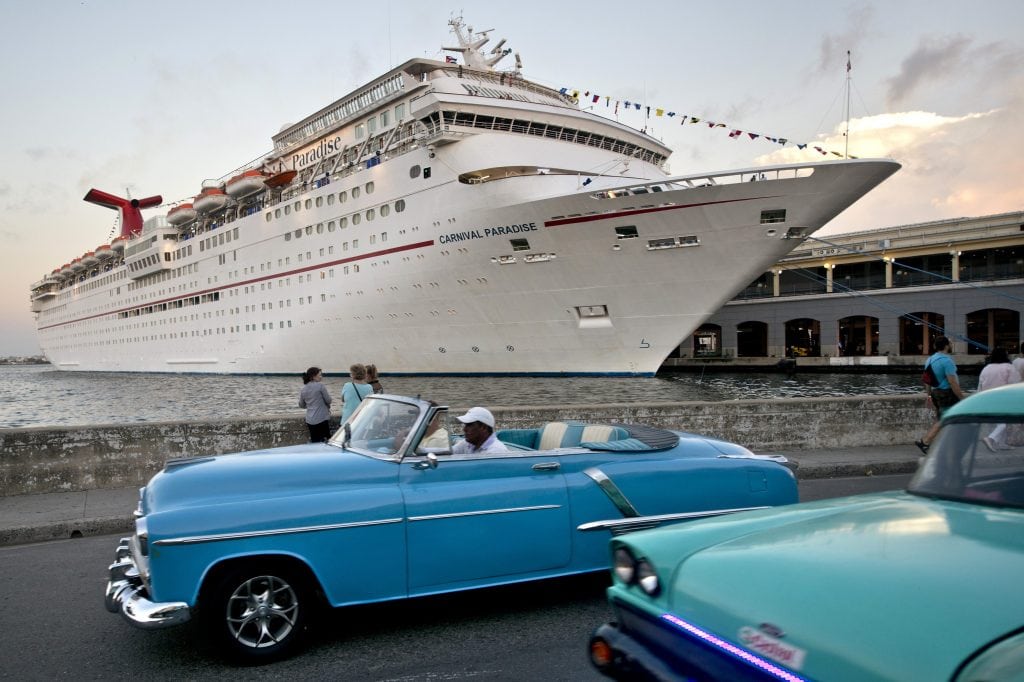Skift Take
This lawsuit against major cruise lines, if upheld after inevitable appeals, could open up a floodgate of litigation against airlines and cruise lines that operated in Cuba after the Obama administration cleared the way.
The Obama administration approved U.S. educational and people-to-people travel to Cuba in 2015, but a U.S. federal judge in Florida last week ordered four major cruise lines to pay more than $400 million in damages plus legal fees to a U.S. company that ran the port in Havana until it was confiscated after the Cuban revolution of 1959.
U.S. District Judge Beth Bloom in the Southern District of Florida ordered Carnival, MSC, Royal Caribbean and Norwegian to pay representatives of the American company, Havana Docks, more than $400 million in damages plus legal fees, according to a Miami Herald story
For example, the judge awarded Norwegian Cruise Line Holdings nearly $110 million in damages, including $27 million in interest, plus $2.8 million in attorneys fees.
U.S. cruise ships in 2016 began traveling to Cuba for the first time in decades following a new cooperative agreement negotiated by Obama, lifting some restrictions of a U.S. embargo in place since the Cold War.
In 2019, the Trump administration ordered such cruises to cease, as part of efforts to pressure Cuba, which at the time was supporting a D.C. nemesis, Venezuelan President Nicolas Maduro. Trump also permitted U.S. citizens to sue third parties for using property seized by Cuban authorities, part of the Helms-Burton Act that had been waived by every previous president since the law’s 1996 passage.
Havana Docks said Cuba never compensated it for the takeover of the property.
The Miami Herald said the cruise lines took in at least $1.1 billion in revenue and paid entities affiliated with the Cuban government after paying the Cuban government $138 million to offer not-so-educational-sounding experiences such as lessons in making cocktails and tours of the famed Tropicana cabaret.
The decision, which will likely be appealed by one or more of the defendants, could have significant implications for the bevy of airlines and cruise lines that did business in Cuba when the Obama administration opened tourism on a limited basis after decades of a shutdown from 2015 to 2019.
“Carnival Corporation engaged in lawful travel explicitly licensed, authorized and encouraged by the U.S. government,” the Miami Herald quoted a Carnival spokesperson as saying. “We strongly disagree with both the ruling and judgment, and plan to appeal these decisions.”
The federal judge held that the cruise lines engaged in illegal trafficking activities by conducting commerce through properties that were wrongly confiscated and without compensation. Cuban Americans and others have long sought compensation for seized properties and businesses.
A provision in a U.S. law enacted in 1996 allowed lawsuits against companies that benefitted from commerce involving confiscated properties in Cuba, but U.S. Presidents Bill Clinton, George W. Bush and Obama suspended it — a string that President Trump broke in 2019 when it was enacted again.
That led to numerous lawsuits, including the one against the cruise lines involving Havana Docks, seeking compensation for confiscated property in Cuba.
The following is the decision in Havana Docks Corp. versus Norwegian Cruise Line Holdings:
The Daily Newsletter
Our daily coverage of the global travel industry. Written by editors and analysts from across Skift’s brands.
Have a confidential tip for Skift? Get in touch
Tags: airlines, carnival, cuba, litigation, msc cruises, norwegian, royal caribbean
Photo credit: Vintage cars pass the Carnival Paradise while the cruise ship is docked in Havana, Cuba. A U.S. federal judge ordered damages against four cruise lines that did business in Cuba. Andy Newman / Carnival Cruise Line
